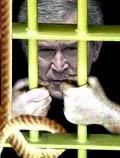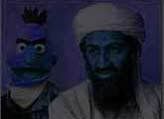| Find |
Wednesday, 2 April 2008
CNN: Iran helped broker ceasefire in Iraq
It was reported on Sunday that Iranian officials had helped broker a ceasefire agreement in the recent fighting between Iraq's government and radical cleric Muqtada al-Sadr.
Iran has close ties to both al-Sadr's movement and Prime Minister Nouri al-Maliki, and representatives of two of the parties in Maliki's coalition traveled to Iran to finalize the talks.
CNN's Nic Robertson reported from Baghdad on Monday that the ceasefire appears to be holding and stores in Basra are reopening. Robertson also explained that the recent violence represented conflict among Shi'ite factions, which was why the Iranians were able to act as brokers.
"The Iranians here are in a very strong position, influencing the government," concluded Robertson. "I think we can expect more of the same."
The San Francisco Chronicle offered a somewhat more detailed explanation of the conflict between the Iraqi government and al-Sadr's followers, noting that "Enmity has long festered between the two sides: one a ruling party that has struggled against the widespread perception that it gained power on the back of the U.S. occupation, the other a populist movement that has positioned itself as a critic of the new order."
"Since U.S.-led forces ousted Saddam Hussein in 2003, the members of the ruling coalition have been viewed by many Iraqis as isolated returning exiles, backed by Iran or the United States. ... In contrast, the al-Sadr movement's foundations are built upon the legacy of al-Sadr's father, who challenged Hussein's rule in sermons before being shot dead in 1999. Its voice - fiercely anti-American and staunchly nationalist - has emerged as one of the few alternatives for Iraqis."
"The animosity also is rooted in a historic rivalry between the al-Sadr religious family, long seen as a champion of the underclass, and the Supreme Islamic Iraqi Council's senior leader, Abdul-Aziz al-Hakim, the son of a conservative grand ayatollah, whose family traditionally enjoyed the support of the country's Shiite merchant class."
This video is from CNN's American Morning, broadcast March 31, 2008.
Posted at
15:13
![]()
Post Title: CNN: Iran helped broker ceasefire in Iraq
![[Zionazis-1.jpg]](https://blogger.googleusercontent.com/img/b/R29vZ2xl/AVvXsEg_x8DOGucgHQmfJJujuK_oYJdxhEnskhQqt-Og7lSk52HeaDQYzW8NQWfdpHmPgj_FJN0jJ3tz1prR1jVZHdHky2HDQxxcs4LVxX0DtAt3fG0sfRr6MDx7Sz8cJNjl0k0RS9TbCjangQ/s1600/Zionazis-1.jpg)




